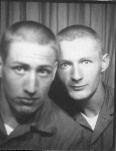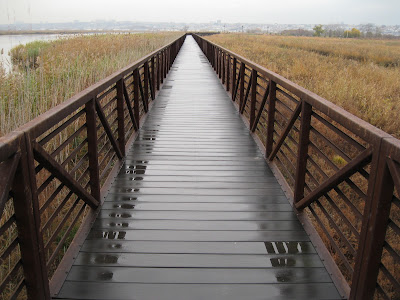63- Free Press Bob to the rescue
Up the street the other way, the Tick Tock Restaurant and
its dark awnings caught my gaze, stirring up memories of the Tick Tock Diner
back east near where Louise and I had met at the print factory. There were
several parking lots beyond that, and a large sign for Bob Smith’s Volkswagen
dealership, a moving and storage place in-between, while in front of a parking
lot for one of the theaters stood a small tin shack with a shoe shine guy
plying his trade.
A Jesus freak shoved a pamphlet in my face. I shooed him
away the way Dan would have. Several shaven-headed Hari Krishnas with their
strange yellow costumes passed by, changing, and ringing chimes, less annoying
than the Jesus freaks, far more attractive to tourists who snapped their
pictures.
A hippie girl in baggy pants and shirt tried to sell me a
two-week-old copy of the L.A. Free Press, telling me she needed the money to
get something to it. I gave her a quarter but told her to keep the paper. Yet
the encounter reminded me of my appointment to meet Dan at the Free Press
office on Argyle. I started in that direction, stepping off the curb just as
the “don’t walk” sign went on, prompting a traffic cop to shout at me.
“Watch it, buddy! You want to get a ticket?”
Argyle was a block
east of Vine along Hollywood Boulevard, passed the tall American Airlines
building on Vine, and the Pantages theater and the United States National Bank,
concrete benches on two corners had advertising on their back, one boasting of
the best legs in town for some women's panty hose product. on the opposite side
of Hollywood was an ominous dark funeral home.
Dan’s direction had me turn left off Hollywood, passed a gas
station on Franklin near an odd intersection where Vine seemed to snake back
and cross both. Small motel-like buildings stood alone one side of the street,
and on the other, Spanish or Italian like stucco buildings with front yards
surrounded by stucco walls, palm trees loomed over the streets on both sides,
hovering in particular over a low string of one-storied cabanas just after I
crossed under the arches of the freeway. The building, Dan directed to me,
might have come straight out of Northern New Jersey with a gate to a front yard
and hedges that hid whatever went on there from anyone on the street.
“Go around the side, not through the gate,” Dan had told me.
By side, he meant the driveway that led under a roofed
section and to a side door where a hand written sign next to the door said,
“Free Press.”
Dan told me local media hated the Free Press for a number of
reasons, often claiming its pages hardly reflected the hip community, but
designed to be read by tourists and other wannabes, something I soon learned
was far from true. Local authorities despised the publication, and more than
one FBI infiltrator had tried to worm his way into the offices downtown in
order to find evidence by which they could be shut down for supposedly
promoting terrorism. The state had filed suit against the paper for its
publishing names and pictures of local narcs, thus rendering the anti-illicit
drug campaign ineffective since everybody knew who to look for even in
disguise.
Even more importantly, the paper served as a means for local
impoverished hippies to have a minimum income as they fanned out across LA and
elsewhere selling the paper on street corners, much the way papers had been
sold in the distant past. Some of this provided cover for dealers, who might
otherwise have been unable to explain their loitering and kept the cops from
busting them – after all the paper fell under protection of the U.S.
Constitution’s First Amendment as much as snobby papers like the Los Angeles
Times hated to admit.
Bob – who we came to call Free Press Bob – ran the Hollywood
distribution out of a small room at the side of this house on Argyle. But it
was more than just a place where people came to pick up papers. It’s bulletin
board became a vital link to services – places to crash, lost and found, people
needing to connect to other people for whatever reason, mysterious messages
posted in private codes for mysterious people to read and respond. Many were
offers for rides to other places or requests for rides, or situations or jobs.
The long room occupied that whole side of the house with a
long counter dividing it in two long ways behind which stood bundles of
newspapers stacked high against the rear wall. Bob sat on one side of his
counter – which stood about three feet off the floor, jotting down figures a
spiral notebook, the kind of notebook I had used for school work back east.
This indicated the number of papers he gave to each client, some of whom he
trusted and gave out on credit, others to whom he gave papers only in exchange
for something important such as identity papers – assuring him that they would
bring back the paper’s share of the sales later.
A number of people simply hung around, seated on the
opposite side of the counter, usually against the wall and under the huge
bulletin board with messages, people too high to wander the street, or without
any place else to go until they acquired some place to crash.
An overhead light illuminated the room. But light also
poured in from the door behind the counter, through which we could see Bob and
his wife’s living quarters.
The place felt warm – warmer than outside even – and the
constantly burning sandalwood incense covered the scent of constantly consumed
joints, one of which generally dangled from Bob’s mouth as he did business.
How old Bob was, I never learned, older by perhaps ten years
than many of the runaways and hippies he did business with, and yet, he looked
still older than that, his hair pulled back and tied in a ragged pony tail. He
wore plain pullover shirts – usually white or light colored, and very loose
baggy sweat pants.
He had a craggy face, partly disguised by a ragged brown goutte,
thin lips and intense dark brown intimidating eyes.
He seemed to trust no one until he knew them a long time and
spoke with a voice made harsh by too many joints and cigarettes, a Tom Waits
kind of voice that gave him the air of a mystic.
From the east like Dan, Bob had lived on the West Coast long
enough to become accepted as a local, apparently starting his west coast life
in San Francisco before wandering down to Los Angeles. He claimed to have been
part of the Haight Asbury scene back before it turned ugly during The Summer of
Love and fled to Hollywood when the scene there got too hectic.
He still liked the music from that part of the world, and
the sound track for the office included Janis Joplin, the Grateful Dead,
Jefferson Airplane and a number of San Francisco bands I’d never heard of but
had developed enough of a following to get a record or two – all of which he
had collected on cassette tapes.
I later learned how much he loved music, and about his vast
collection of well-known and unknown songs he had captured off the radio
airways, catalogued in notebooks not much different from the ones he kept for
the newspaper records. Dan suggested Bob might have been an accountant in his
previous life.
“He’s always into things like that,” Dan said.
Bob’s wife – who often sat behind the counter next to him –
was a classic hippie chick, slightly overweight, always mellow if not high,
dressed in flowing blouses and skirts, and a headband holding back her thick
brown hair. Her broad face had an equally broad smile, though her eyes showed
some other hidden aspect of character not as friendly as her demeanor
suggested. She came to like me and Louise, as did Bob after a time.
She was not in the room when I entered this time, only Bob,
and Dan near the door smoking one of his dark filter less Sherman cigarettes.
Several hippies sprawled on the floor in the corner, stoned or asleep,
unconscious none-the-less.
“There are you?” Dan said when he saw me. “I thought maybe
you forgot.”
“No,” I said. “It just took a little longer for me to do
what I needed to do.”
Dan didn’t ask what, but said, “I was just talking about you
to Bob.”
“Nothing good, I hope,” I said and laughed.
“About you and the cops.”
A chill went through me as I glared at Dan, trying to work
out from his expression what exactly he had told Bob, and whether or not I
should be angry.
“Not the particulars,” Dan said, reading my fears from my
expression. “But I told him you shouldn’t be running around using your real
name or any name you don’t have ID for.”
“I don’t exactly have a choice,” I said. “I threw away from
real identification as soon as I got to LA.”
I recalled dropping the papers down the air shaft back at
Roachville.
“Yes, but you’ll need something,” Dan said. “If you get
stopped by the fuzz and don’t have anything, they might hall you into the
station on Wilcox until they find out who you are.”
“So, what do I do about it?” I asked.
“I have some papers I can sell you,” Bob said.
“How is that possible?”
“People leave ID with me in exchange for bundles of papers,”
Bob said. “If they don’t come back. I keep and later sell their ID.”
“And you have some ID to sell me?”
“As a matter of fact, I do,” he said. “A rather complete
packet, I might add.”
“Show him,” Dan suggested.
Bob pulled out a large brown envelop from under his side of
the counter and dumped out the contents in front of me, six piece of legal
documents all bearing the same name – Ernest Hoffee – a driver’s license from
Canton, Ohio, a draft card, even a birth certificate among them as well as a
library card and other pieces.
“The man dropped this stuff off weeks ago and never came
back,” Bob said. “I didn’t have time to sell them. But if you want, I’ll sell
them to you cheap.”
As it turned out, he wanted $30 (or as I would think later,
30 pieces of silver) since the poor man who left them would likely get stopped
somewhere and held until he could prove who he was.
“That should keep the heat off your back,” Dan said.
I agreed and slid the money out of my wallet, then put each
of the precious documents in, already feeling more secure.
“Now,” Dan said. “Let’s go see about getting some acid.”



Comments
Post a Comment